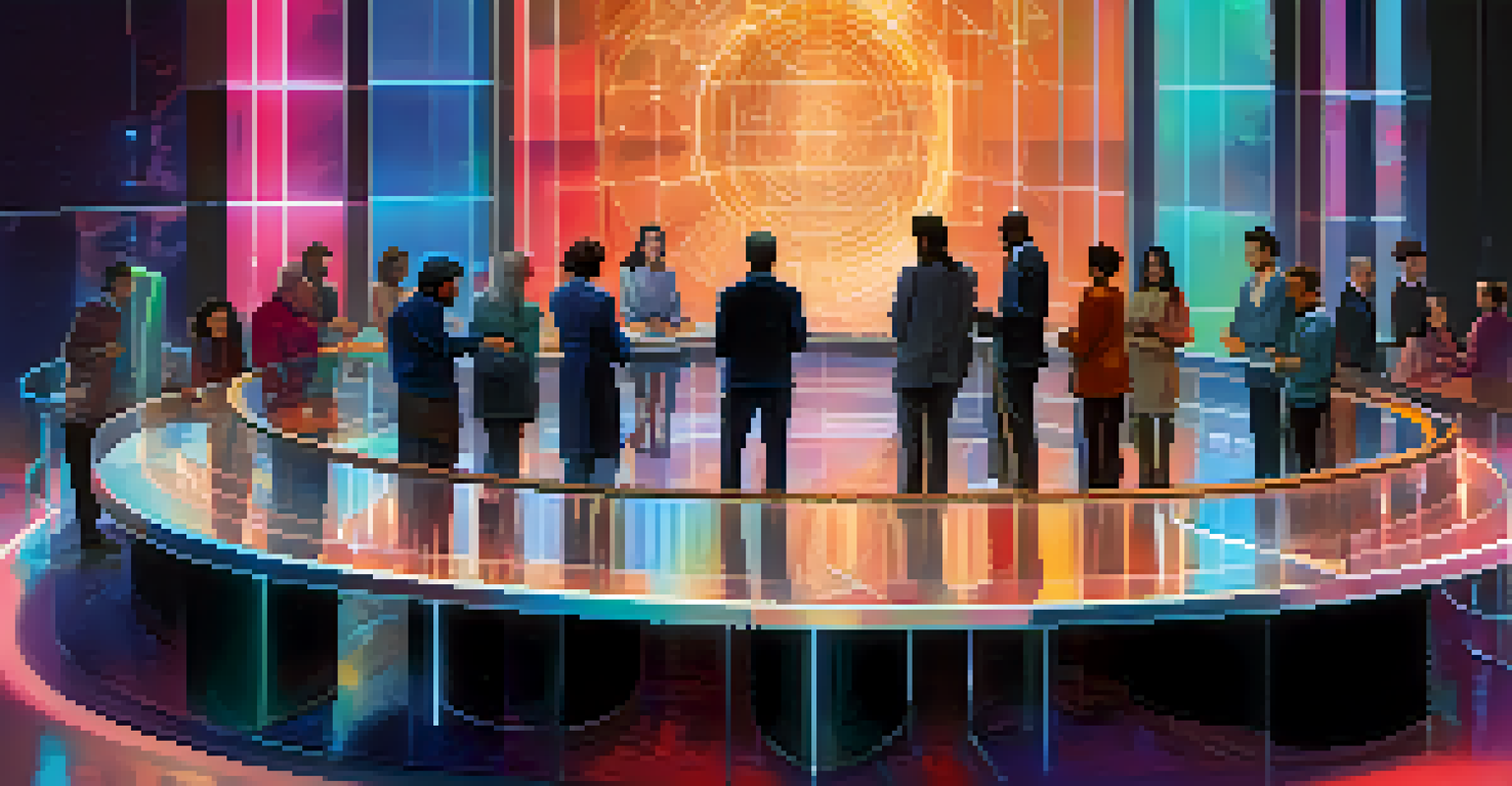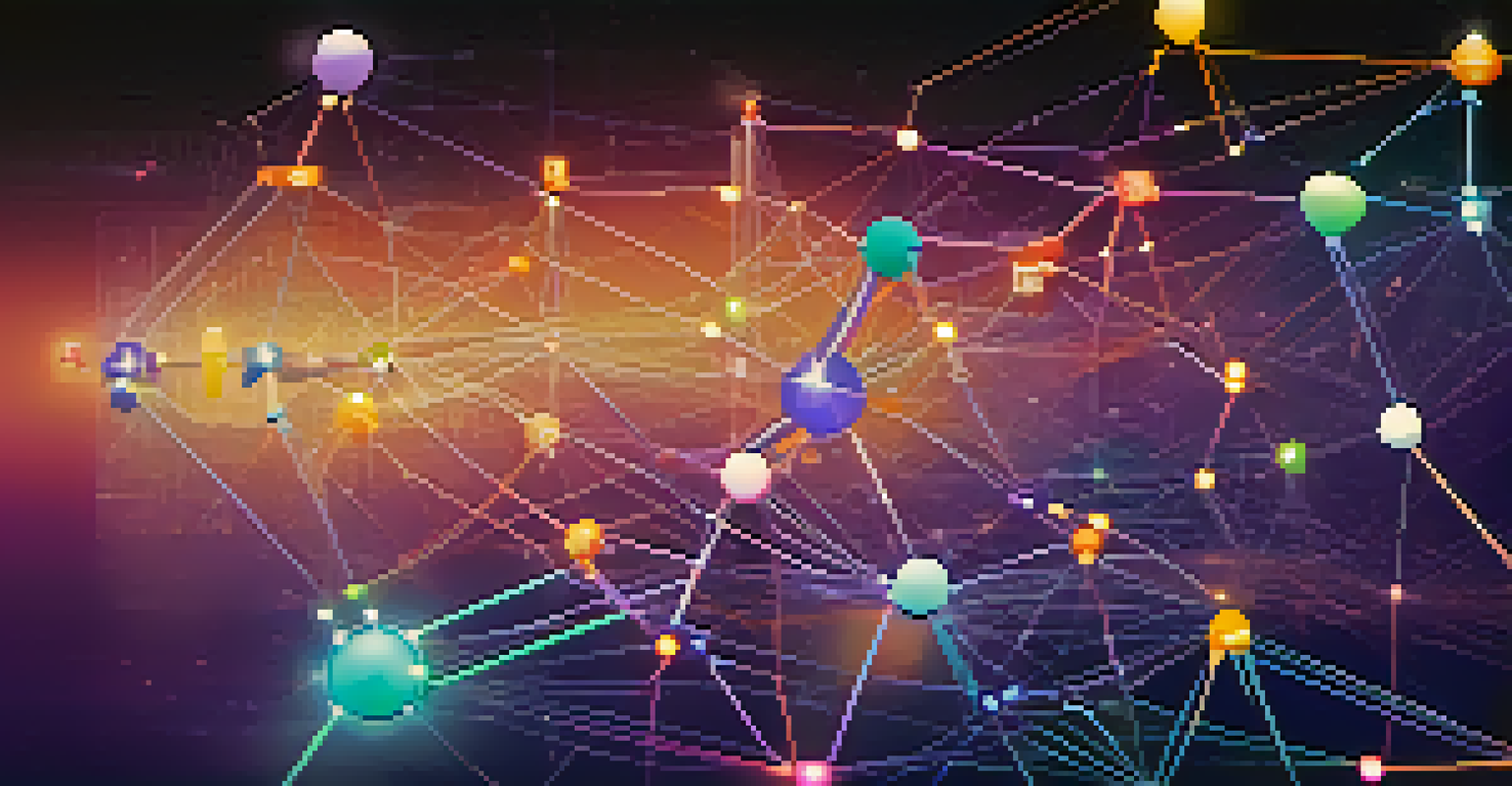The Role of Smart Contracts in Blockchain Governance

What Are Smart Contracts and How Do They Work?
Smart contracts are self-executing contracts with the terms of the agreement directly written into code. They run on blockchain technology, ensuring that transactions are recorded and enforced transparently. Imagine them as digital vending machines: you input your choice, and the machine automatically delivers your item without needing a cashier.
Smart contracts are the digital equivalent of a vending machine, automating transactions without the need for intermediaries.
When a specific condition is met, the smart contract executes the terms automatically. This eliminates the need for intermediaries, reducing costs and increasing efficiency. For instance, in a blockchain voting system, a smart contract can automatically count votes and determine the winner without human intervention.
However, it’s important to understand that while smart contracts can automate processes, they rely heavily on the accuracy of the input data. If the data fed into the contract is flawed, it can lead to unintended consequences, much like a faulty vending machine can give you the wrong snack.
The Importance of Governance in Blockchain Networks
Governance in blockchain refers to the frameworks and rules that dictate how a blockchain operates and evolves. In a decentralized environment, governance is crucial for making decisions about protocol changes, dispute resolution, and overall network management. Think of it as the constitution of a country, guiding how its citizens interact and make decisions.

Effective governance ensures that all participants have a voice and that changes are made in a fair and transparent manner. This is particularly important in decentralized networks where no single entity has control. A well-structured governance system can enhance trust among users and promote long-term stability.
Smart Contracts Automate Governance
Smart contracts streamline governance by automating decision-making and execution, enhancing efficiency and transparency.
Without proper governance, a blockchain network can become chaotic, leading to disagreements and forks in the protocol. Just like a community without rules may descend into disorder, a blockchain lacking governance can struggle to grow and evolve effectively.
How Smart Contracts Facilitate Governance Processes
Smart contracts streamline governance processes by automating decision-making and execution. For example, in a decentralized autonomous organization (DAO), smart contracts can automatically execute decisions based on voting outcomes. This means that once a proposal is approved by the community, the contract takes over, ensuring swift implementation.
The future of smart contracts in governance hinges on transparency and active participation from all stakeholders.
By using smart contracts, stakeholders can reduce the potential for manipulation or bias in governance decisions. The transparent nature of blockchain ensures that all actions are recorded and can be audited at any time. This level of transparency fosters trust and accountability among participants.
Moreover, smart contracts can be programmed with specific rules and conditions, ensuring that governance is not only efficient but also adheres to agreed-upon standards. This is akin to having a referee in a sports game who enforces the rules impartially, allowing the game to proceed smoothly.
Challenges of Implementing Smart Contracts in Governance
While smart contracts offer many benefits, implementing them in governance comes with challenges. One major issue is the complexity of coding these contracts accurately. A small mistake in the code can lead to significant consequences, similar to how a typo in a legal document can change the meaning entirely.
Additionally, the legal status of smart contracts remains unclear in many jurisdictions. Without clear legal recognition, participants may face risks when relying on these contracts for governance functions. This uncertainty can hinder wider adoption and could leave users vulnerable to disputes.
Governance is Key for Blockchain
Effective governance frameworks are crucial for decentralized networks to ensure fair decision-making and maintain trust among participants.
Furthermore, ensuring that all stakeholders understand how smart contracts function is essential for effective governance. If users are not tech-savvy, they may struggle to engage meaningfully in the governance process, potentially excluding important voices from decision-making.
Real-World Examples of Smart Contracts in Governance
Several blockchain projects are already leveraging smart contracts for governance. For instance, the Ethereum platform allows users to create DAOs where members can propose and vote on changes using smart contracts. This democratic approach empowers the community to shape the direction of the project collectively.
Another example is Aragon, a platform that enables users to create and manage decentralized organizations using smart contracts. Aragon's framework provides tools for governance, allowing participants to vote on key decisions seamlessly. This illustrates how technology can democratize organizational management.
These examples highlight the potential of smart contracts to transform governance by making it more inclusive and efficient. As more projects adopt this technology, we may see a shift in how organizations operate, moving towards a more decentralized and community-driven model.
The Future of Smart Contracts in Blockchain Governance
The future of smart contracts in blockchain governance looks promising as technology continues to evolve. With advancements in blockchain scalability and interoperability, we can expect smarter and more versatile contracts. This could enable even more complex governance structures, allowing organizations to operate more fluidly across different networks.
As awareness of decentralized governance grows, more organizations may adopt smart contracts to enhance transparency and efficiency. This trend could lead to a broader acceptance of blockchain technology beyond cryptocurrencies, impacting various sectors including finance, supply chain, and even public administration.
Challenges in Smart Contract Use
Implementing smart contracts in governance faces challenges such as coding complexity and legal uncertainties, which can hinder adoption.
However, for this future to materialize, ongoing education and collaboration among stakeholders will be essential. Just as a community thrives when its members are informed and engaged, the success of smart contracts in governance will depend on the active participation of all involved parties.
Conclusion: Embracing Smart Contracts for Better Governance
In conclusion, smart contracts hold the potential to revolutionize governance in blockchain networks by automating processes and ensuring transparency. They provide a framework that can enhance trust among participants and streamline decision-making, making governance more efficient. As we’ve seen, the implementation of smart contracts comes with both opportunities and challenges, but the benefits could outweigh the risks.
Looking ahead, it's crucial for stakeholders to engage in discussions about best practices and legal frameworks surrounding smart contracts. By fostering an environment of collaboration and education, we can harness the full potential of this technology for effective governance.

Ultimately, embracing smart contracts could pave the way for a new era of decentralized governance, where every voice matters and decisions are made fairly. The journey is just beginning, and as we explore these possibilities, the future of blockchain governance looks brighter than ever.